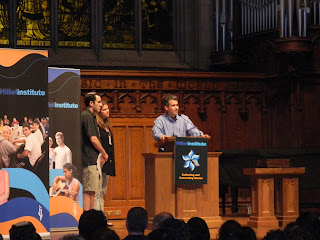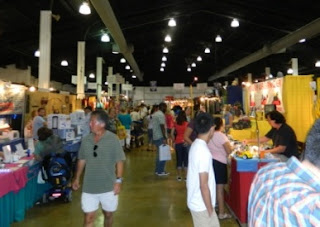 A week ago, I left and returned from attending the second annual Hillel Institute. In the spirit of some of my recent posts (including my conference anticipations), I'm going with ten reflections on the conference:
A week ago, I left and returned from attending the second annual Hillel Institute. In the spirit of some of my recent posts (including my conference anticipations), I'm going with ten reflections on the conference:
1) I was happy to see more tweeting (cf. picture to the right) taking place at this year's conference than at last year's conference. It seemed that not only that there were about twice as many people tweeting about the conference, but the plenary address by Wayne Firestone had some active tweeting, which was excellent, allowing even people not there to follow along with his address. I am hoping that next year's address will have an even more robust parallel conversation taking place!
2) The highlight for me was the rabbis sessions. It wasn't just hanging out with the other YCT graduates (which was great(!)), but engaging in discourse about delivering Jewish content to the students, which is a core element of
 Hillel. Moreover, one of the fascinating aspects of the rabbis' discussions was that we bring much different view of Hillel and the Jewish world than do engagement or programming associates, for instance. We are critical of Hillel because we want to see good Jewish identity growing - it's fascinating stuff :)
Hillel. Moreover, one of the fascinating aspects of the rabbis' discussions was that we bring much different view of Hillel and the Jewish world than do engagement or programming associates, for instance. We are critical of Hillel because we want to see good Jewish identity growing - it's fascinating stuff :)
3) Once again, we visited the very trippy City Museum, which seems to get stranger and more random every step one takes in a mind-blowing way....
4) Wayne Firestone turned in another Steve Jobs-like performance.
5) The Richard M. Joel Exemplar of Excellence Awards and Milestones once again went smoothly, quickly, and excellently! (Pictured to the l
 eft: Wayne Firestone speaking at the awards ceremony)
eft: Wayne Firestone speaking at the awards ceremony)
6) When I read the paper that was sent out to conference attendees, I was enthralled and impressed by the author's understanding of leadership and how to employ that through the vehicle of narrative. Granted, my skills as a raconteur are lacking, but it's a tool I need to develop....
7) The bulk of our sessions were "Track sessions" which were based around the aforementioned paper. I think they weren't that great: they were based off of a good idea, but we didn't need that much time to deal with it (and it was a fair degree of writing). (For a more positive assessment of these, see this post.) Interestingly, over the weekend, I then realized it actually was more helpful than when I was in the moment (nevertheless, it was too much time...). Personally, it would have been nice to have a couple of sessions of didactic information (e.g. How-Tos)....
8) Now that I've sort of beaten up on the aforementioned sessions, we did develop a better sense of where we wanted to take Beach Hillel this coming year, which would not have occurred were it not for the conference.
9) There was some great networking there - whether it was with other Hillel professionals there or representative of organizations at the organizational fair. For some organizations and
 Southern Californian Hillels, it was how could we work together, which is eminently helpful. For some people, it was nice to meet such interesting and good people. For others, it was who I might want to work with me in the future.
Southern Californian Hillels, it was how could we work together, which is eminently helpful. For some people, it was nice to meet such interesting and good people. For others, it was who I might want to work with me in the future.
10) I got to hear a tremendously simple, yet helpful guiding question of What are we trying to accomplish in any given activity, whether it is a shabbat dinner, class, or Rabbi's Hours? For me, sometimes the answers are so obvious I don't even think about it/them. However, re-investigating the questions and then articulating the answers can better serve me in being effectual.
Overall, the conference was good, once again, and I look forward to attending next year (if possible).





